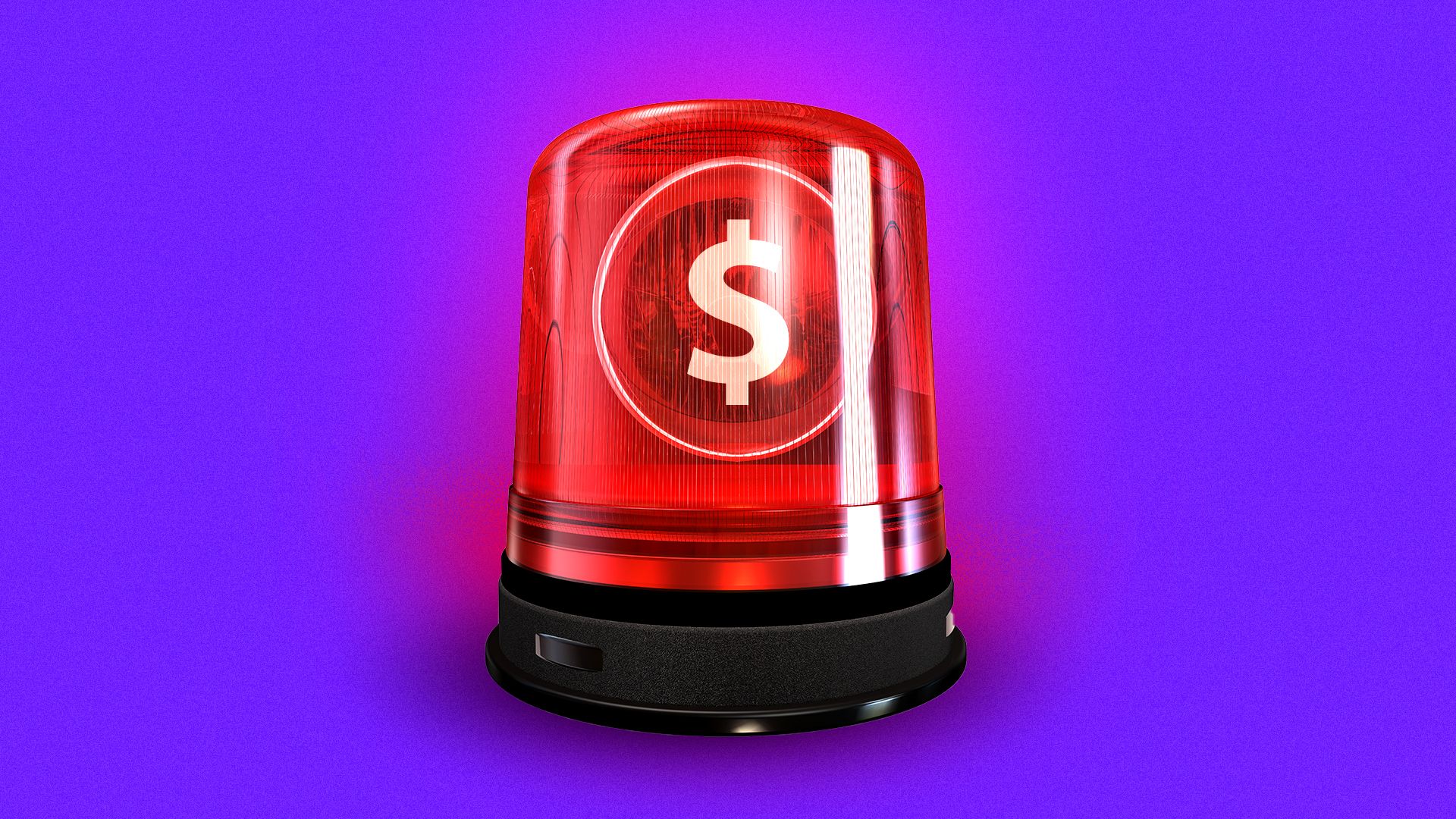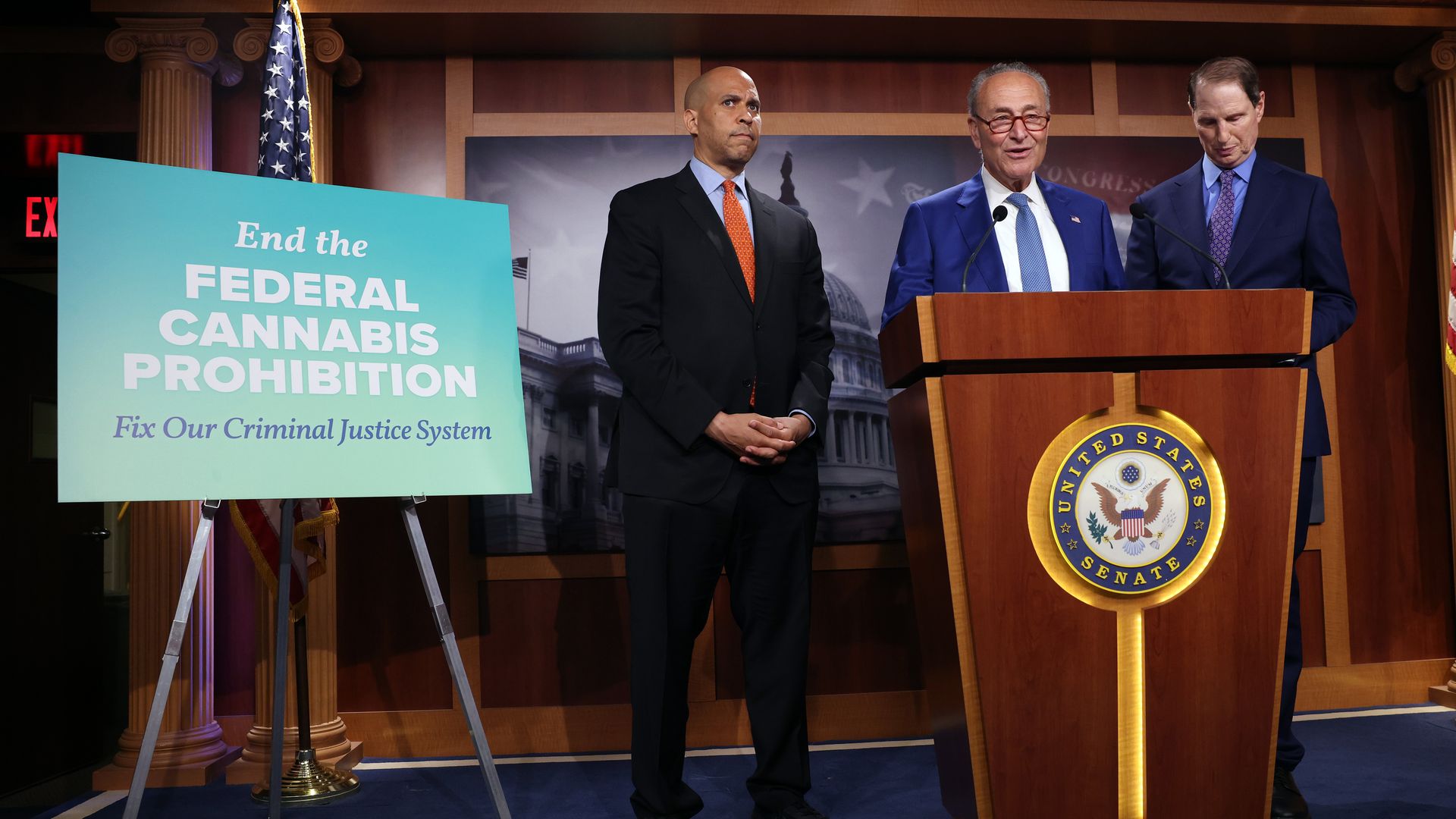| | | | | | | Presented By ProEdge, a PwC Product | | | | Axios Markets | | By Sam Ro ·Jul 15, 2021 | | Today's newsletter is 1,266 words, 5 minutes. 🩺of the day: 24.5% of American adults had an appointment with a doctor, nurse or another health professional by video or by phone in the last four weeks. - Census | | | | | | 1 big thing: CEOs sound the alarm on inflation |  | | | Illustration: Annelise Capossela/Axios | | | | CEOs are speaking up about what we've seen in the government data: inflation. And some of them warn elevated levels of inflation could persist. Why it matters: Prices for goods and services have been rising at a historic pace, a phenomenon that many economists have characterized as transitory. - Business executives offer unique perspectives on the matter as they are directly exposed to rising raw materials and labor costs.
- Furthermore, they're the ones setting prices on what their businesses sell.
What they're saying: Inflation may be more than a temporary phenomenon. - "The inflation could be worse than people think," JPMorgan Chase CEO Jamie Dimon said on an earnings call Tuesday. "I think it'll be a little bit worse than what the Fed thinks. I don't think it's only temporary."
- "[Policymakers] are saying jobs are more important than consumerism," BlackRock CEO Larry Fink told CNBC on Wednesday. "That is going to probably lead to systematically more inflation."
State of play: Executives are explicitly saying that they're raising the prices they charge customers. - "Is there somewhat more inflation out there? There is," PepsiCo CFO Hugh Johnston said on an earnings call Tuesday. "Are we going to be pricing to deal with it? We certainly are."
- "Will Conagra take list pricing increases? The short answer is, yes," Conagra CEO Sean Connolly said. "And we have more pricing coming."
- "[We've] done at least one large [price] increase earlier in the second quarter, and that was received fairly well," Fastenal CFO Holden Lewis said on an earnings call Tuesday. "But based on what cost is doing, we'll have to go to the market with some additional ones."
Yes, but: Not all companies are raising prices. Here's what FreshDirect interim CEO Farhan Siddiqi told Bloomberg about how he was addressing customers' concerns about inflation. - "We're lowering prices on fresh items like berries, salmon and ground beef," he said. "Right now we're also are absorbing inflation and not passing it along."
- Lowering prices can be a smart strategy amid rising costs if FreshDirect is able to win more business.
The bottom line: While it's possible executives could be exaggerating risks affecting their business, they should still be taken seriously. During the previous earnings season, execs were unusually vocal about inflation at that time too. And their alarms showed up in the inflation reports that followed. |     | | | | | | 2. Catch up quick | | Fed chair Jerome Powell reiterated his position that inflation would "likely remain elevated in coming months before moderating." (Federal Reserve Board) China's GDP grew at a 7.9% rate in Q2, down sharply from the record 18.3% rate in the prior quarter. (Reuters) Johnson & Johnson has recalled Neutrogena and Aveeno brand spray sunscreens over possible cancer risk. (Axios) |     | | | | | | 3. A little too much of a good thing |  | | | Illustration: Sarah Grillo/Axios | | | | If Democrats in Congress get their way, we're about to see some $4.5 trillion in new infrastructure spending, which will only add to inflationary pressures, Axios Capital author Felix Salmon writes. The big picture: As Andrew Ross Sorkin writes in the NYT: "Inflation has long been seen as the economic villain. That view is changing." There is evidence that inflation is associated with lower inequality; it also helps to reduce the real value of fixed debts such as student loans. How it works: There are different types of inflation. - Asset-price inflation (aka the stock market going up) is generally considered to be a good thing. Rising house prices are more of a mixed bag.
- If a fast-food meal has been artificially underpriced for years due to workers being paid much less than a living wage, then food-price inflation looks a lot like redistribution of wealth to people who need it. The same applies in many other service industries.
- When pandemic-related supply-chain issues cause shortages that in turn cause price hikes, that's more unambiguously negative.
- When the economy as a whole grows so fast as to exceed its fundamental capacity, that causes what economists call "overheating." There's no evidence that's happening now, however: Only 34% of goods and services have risen in price by more than 2% over the past year, and that percentage is falling rather than rising.
The bottom line: Inflation, while high, is not yet worrisome. Long-overdue infrastructure spending is a much higher priority. Go deeper. |     | | | | | | A message from ProEdge, a PwC Product | | Align skills and culture with the changing nature of work | | |  | | | | Readying the enterprise for the future typically includes investment in new technologies. But it also requires ensuring your organization has the right skills to make the most of these technologies. Read the guide from ProEdge, a PwC Product. | | | | | | 4. Cash for clunkers |  Data: Edmunds; Chart: Danielle Alberti/Axios Even older cars with a ton of mileage are in high demand. Why it matters: Supply chain issues in the auto market unexpectedly fueled an explosion of demand for used cars. By the numbers: While the most popular vehicles in the wholesale used car market consist of lightly driven 2018 models, Edmunds found that even older ones with a lot of mileage are in high demand. - The average sale price of a used car with 100,000-109,999 miles rose to $16,489 in June. This is up 31% from $12,626 a year ago, which was barely higher than June 2019's average price of $12,528.
- It took an average of 30.5 days to sell these vehicles during the month, down from 37.7 days a year ago.
- Ford F-150s with an average age of 7.2 years are selling for $25,924, up from $18,092 a year ago.
What they're saying: "We're seeing 7- to 8-year-old vehicles with more than 100,000 miles commanding prices today that are more like the cost of 5-year-old vehicles with 60,000-80,000 miles a year ago," Edmunds senior manager of insights Ivan Drury said. - Drury tells Axios that the average price of these "clunkers" had moved sideways for years before the current frenzy for used cars.
The bottom line: If you have a car sitting around that you've been putting off selling, now's a great time to put it on the market. |     | | | | | | 5. No cannabis banking bonanza yet |  | | | Photo: Kevin Dietsch/Getty Images | | | | A trio of Senators unveiled draft legislation on Wednesday to decriminalize marijuana at the federal level and turbocharge an industry already expected to generate $92 billion in revenue this year, Axios' Kate Marino writes. Driving the news: Senate Majority Leader Chuck Schumer (D-N.Y.), Sen. Cory Booker (D-N.J.) and Sen. Ron Wyden (D-Ore.) introduced the proposed bill, which would allow states to decide for themselves if they want to legalize marijuana or not. Why it matters: The bill would take marijuana off the list of controlled substances, which means cannabis companies could begin using banks and stock exchanges. Yes, but: Any weed legalization bill will likely face a difficult path forward in the Senate, as Axios reported. - Publicly traded cannabis-related companies, like Canadian producer Tilray and ancillary products maker GrowGeneration, both traded down in Wednesday's session thanks to skepticism that the bill will even pass, Bloomberg reports.
- The stocks had initially gained on Tuesday in anticipation of the bill.
What they're saying: Booker emphasized that he wants to see a "fair playing field" in the business opportunities that are created. - "Right now in many states, someone who has a criminal conviction for selling marijuana can't get a license," he said. "I will lay myself down, to do everything I can, to stop an easy banking bill that's going to allow corporations to make a lot more money off of this — as opposed to focusing on the restorative justice aspect."
Of note: The current proposal provides that tax revenue collected from marijuana would be used to fund grant programs for communities most impacted by marijuana prosecutions. What to watch: Whether the proposal survives in its current form, including the social equity aspects, or if negotiations lead to a more slimmed-down bill focusing only on access to banking. - The provisions allowing banking and stock exchange access are "the only thing that has buy-in from all sides," Todd Harrison, the chief investment officer of CB1 Capital, told Bloomberg.
|     | | | | | | A message from ProEdge, a PwC Product | | Align skills and culture with the changing nature of work | | |  | | | | Readying the enterprise for the future typically includes investment in new technologies. But it also requires ensuring your organization has the right skills to make the most of these technologies. Read the guide from ProEdge, a PwC Product. | | |  | | It'll help you deliver employee communications more effectively. | | | | | | Axios thanks our partners for supporting our newsletters. If you're interested in advertising, learn more here.
Sponsorship has no influence on editorial content. Axios, 3100 Clarendon Blvd, Suite 1300, Arlington VA 22201 | | | You received this email because you signed up for newsletters from Axios.
Change your preferences or unsubscribe here. | | | Was this email forwarded to you?
Sign up now to get Axios in your inbox. | | | | Follow Axios on social media:    | | | | | |








No comments:
Post a Comment